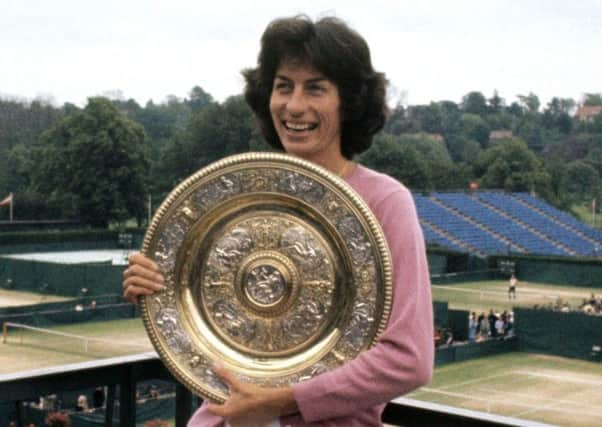Nostalgia: When Virginia served up a triumph for the Queen


Yet, while today’s power-dominated game is unrecognisable to the more graceful rallies of four decades ago, the pressure of being the home favourite in the greatest tennis tournament of all is as onerous now as it was in Silver Jubilee year when Wade won the centenary championship in front of the Queen.
“It’s awful,” lamented Wade this week as she offered this advice to 26-year-old Konta. “It takes a long time before it carries you rather than oppresses you. I would liken it to a wave that either takes you on an exhilarating ride or else dumps you in the sand a very unpleasant way.
Advertisement
Hide AdAdvertisement
Hide Ad“I think she’s got a chance to do very well, and by very well I think semi-finals. It would take a lot – a good draw, her playing well and everything going right for her to actually get to the final. Certainly without the ones who are constant winners, the Serena Williams of this world, maybe she’s got as good a chance as anybody else. But it is a lot of pressure.”
Wade, 71, should know. Just as Sir Andy Murray – and his faithful followers – had to endure countless disappointments before he finally prevailed in 2013, and then against last year, so did this unlikely winner whose best days were thought to be behind her as she embarked upon her 16th attempt to win the Venus Rosewater Dish and first prize of £13,500 (it is just £2.2m this upcoming fortnight).
A quarter-finalist in 1967, the former US Open and Australian Open winner beat Jo Durie in the first round in 1977 and had a relatively smooth passage to the semi-final where her match with Chris Evert, already a multiple singles champion at the age of 22, was a three-set thriller.
Yet, while the nation craved an all-British final between Wade and her great rival Sue Barker, the latter lost her semi-final encounter to the imposing Dutch player Betty Stove, who was a renowned doubles player now preparing for her first grand slam final.
Advertisement
Hide AdAdvertisement
Hide AdThe final was not the forecast formality. Played on a Friday afternoon under sun-kissed skies with the Queen sitting regally in the front row of the Royal box, sports fans huddled around TVs or listened to Max Robertson’s velvet-like commentary on Radio 2.
Indeed the country seemed to sense Wade’s nerves as she lost an error-strewn first set 6-4. “She was one of these very awkward players because she was so tall and strong,” she recalled. “Of course, the crowd was absolutely phenomenal but they were getting a little concerned and so I had to try not to be worried about losing the first set.
“Fortunately, I got a break right at the beginning of the second. I was probably momentarily nervous at 3-3 in the second set but from then on I got into ‘the zone’, I couldn’t do anything wrong. I was so high in a way on playing well that I was chasing everything. I always remember she hit a volley out wide to my forehand. I was never going to get there but I felt like I could do anything and I flew into the tramlines and hit the deck.”
Wade finally secured the second set 6-3 and had momentum despite occasional lapses of concentration that prompted great gasps from those courtside – and rather more intemperate language from those watching on TV – as the nation sought a lift from the political and economic turmoil of the 1970s.
Advertisement
Hide AdAdvertisement
Hide AdSo tense, it was as if the country was playing every point. The pressure was reflected by this comment by Robertson, the doyen of tennis commentators, as the denouement drew nearer: “If she gets the jitters now, then she isn’t the great champion that she is.”
Yet his words, on match-point, could not have been more emblematic of the occasion. “Match point, second serve. Stove serves, it’s right, a forehand return by Wade down the line, Stove can’t get it. Virginia has won. Virginia Wade has won the centenary title, with the Queen watching her. Virginia will take tea with the Queen.”
Wade had won nine out of the final 10 games en route to a 6-1 victory in the final set, though this edgy encounter was by no means that one-sided.
As the crowd burst into a rendition of ‘For she’s a jolly good fellow’, Stove ignominiously went on to lose the final of both the women’s doubles and mixed doubles.
As for Virginia Wade, this was as good as it would get.
Advertisement
Hide AdAdvertisement
Hide AdThe winner of 55 tournaments, and a top 10 player from 1967 to 1979 when Martina Navratilova began to dominate with a ruthless serve and volley game, she retired from singles competition in 1985.
“It’s just hard to believe it’s been 40 years,” she said.
“There was a lot about that tournament that was a good omen. I knew I was running out of time but I knew I was playing well.
“Two years before, I felt like I had been ready to win Wimbledon but then I played Evonne Goolagong in an unbelievably good match. The extra motivation of the centenary of the tournament and the Queen being there, it balanced in the right direction.
“You’re always trying to tell yourself that this is the one and align all the stars, and sometimes you’re fooling yourself.”
She was not.